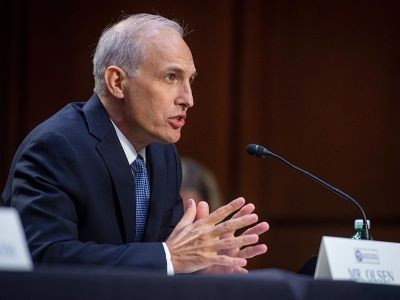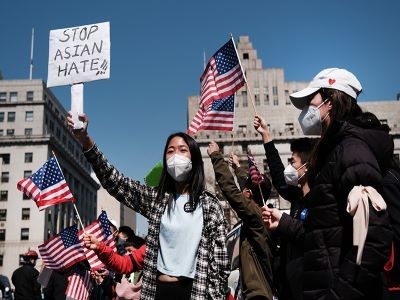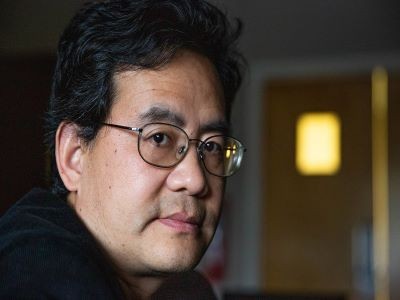[ad_1]
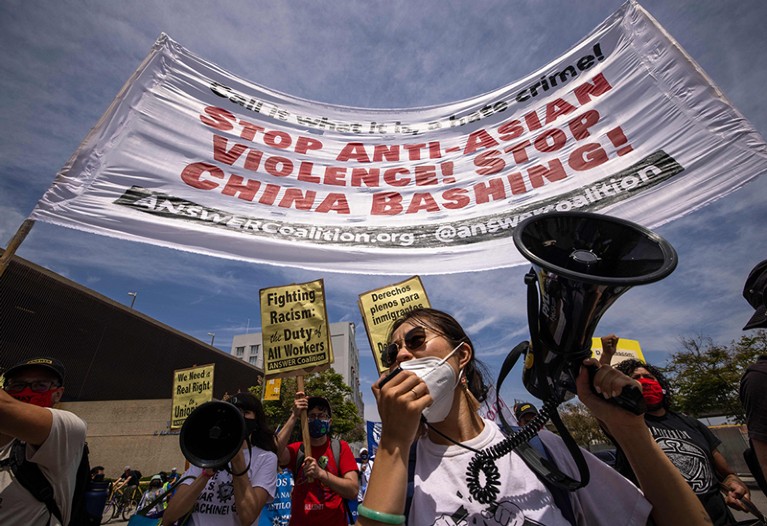
Activists in Los Angeles, California, protest anti-Asian racism, which some say that the China Initiative helped to perpetuate.Credit: David McNew/AFP/Getty
One year after the US government ended its controversial China Initiative, scientists of Chinese heritage say that they are still being targeted unfairly and fear for their safety.
The initiative — which was aimed at safeguarding US laboratories and businesses from espionage — created the perception of bias against researchers of Chinese descent, said assistant attorney-general Matthew Olsen when shutting it down in February 2022, although he denied that the programme had actually used racial profiling. While it was active, more than 150 people were criminally charged for actions such as failing to disclose funding or partnerships with institutions in China, according to an analysis by MIT Technology Review. Nearly 90% of them were of Chinese heritage. Many of the charges brought by the US Department of Justice (DoJ) after the initiative’s launch in 2018 were eventually dropped or dismissed, and some prosecutions ended in acquittal.
The controversial China Initiative is ending — researchers are relieved
The climate of fear and anxiety hasn’t gone away — researchers are just being pressured in a new way, says Jenny Lee, a social scientist at the University of Arizona in Tucson who studies research collaborations and geopolitics. Since the initiative’s official shutdown, the US government has adopted various anti-China policies. And although the DoJ is pursuing fewer criminal charges, it says that it will work increasingly with federal agencies to investigate researchers and issue civil and administrative penalties for noncompliance. Universities are also taking a more active role in assisting investigations and pursuing potential wrongdoing, sources tell Nature.
“I’m sorry to say that it has only intensified,” says Gang Chen, a mechanical engineer at the Massachusetts Institute of Technology in Cambridge, who was arrested in January 2021 under the China Initiative, only for the DoJ to drop the charges a year later. He and others who have had their lives upended by the initiative have been speaking out about the damage that it has done.
“The government has not done enough” to ease the situation, Chen adds. The DoJ did not respond to Nature’s request for comment.
Policy shift
One example of a university taking a more active role in the initiative’s wake was reported by the San Diego Union-Tribune in December 2022. Xiang-Dong Fu, a molecular biologist at the University of California, San Diego (UCSD), was forced to quit his position after the university accused him of hiding ties to China. UCSD said he had violated its conflict-of-commitment policy by accepting travel reimbursements from Chinese institutions that he had visited, and had failed to disclose Chinese grants that bore his name. Fu denies any wrongdoing, according to the Tribune.
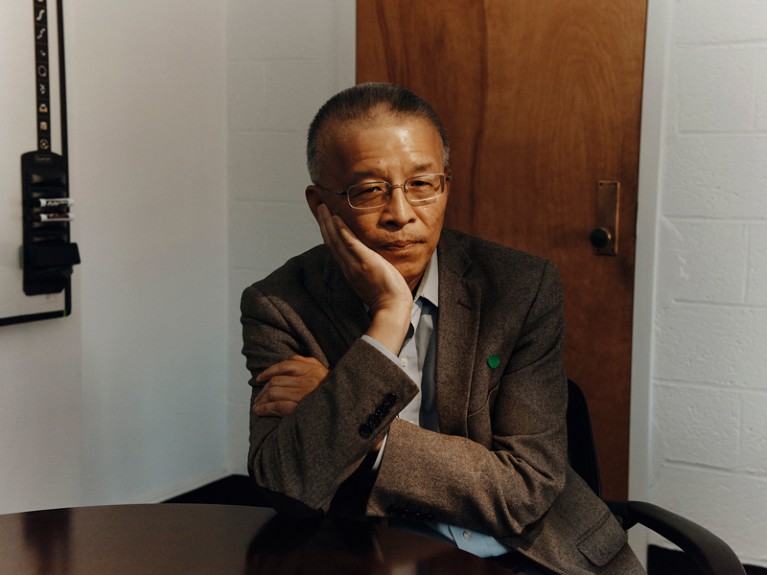
The US Department of Justice dropped charges against mechanical engineer Gang Chen in early 2022. He was arrested one year earlier for hiding ties to China.Credit: Tony Luong/New York Times/Redux/eyevine
Universities reject the idea that they are unfairly targeting researchers of Chinese heritage. According to Toby Smith, vice-president for science policy and global affairs at the Association of American Universities (AAU) in Washington DC, US institutions acknowledge the considerable research contributions from these scientists. Universities are working to ensure that all faculty members are disclosing information properly, he adds.
But he calls on US funding agencies to provide greater clarity for universities on what counts as an offence and what are appropriate and fair sanctions.
Scientists need support, says Gisela Kusakawa, executive director of the Asian American Scholar Forum, a non-profit organization based in New York City. Universities and agencies should provide training for scientists on how to complete disclosure forms, and they must allow scientists the opportunity to revise completed forms to ensure that they are correct, she says.
The illusion of improvement
In the past year, the US government has adopted several policies and positions that have perpetuated the narrative that scientists from China are potential spies, Lee says. In August 2022, the US Congress passed into law the CHIPS and Science Act, which earmarks an extra US$280 billion for research and innovation and includes measures designed to tighten research security. For example, it asks US institutions to report gifts of $50,000 or more from a foreign government, down from the previous minimum of $250,000.
Scientists’ fears of racial bias surge amid US crackdown on China ties
In January, Congress also voted to form a bipartisan committee to assess the economic and competitive threats that China poses to the United States. The AAU has said that the creation of the committee signals an intent in Congress to monitor China’s influence on the nation’s scientific enterprise.
The US government has caught genuine Chinese spies stealing trade secrets and scientific and technological developments. But many say that the government’s broad-brush scrutiny of researchers of Chinese descent is excessive, and could actually harm national security by demonizing scientific collaboration with China and driving out scientists who contribute to US scientific prowess. In a survey published this week1, Lee says, she found a link between fears of racial profiling and a desire among scientists to return to China.
The end of the China Initiative gave the illusion that researchers of Chinese heritage would be targeted less, she says, but “the chilling effect” is “still very much at play”.
Afraid of doing research
Researchers unjustly accused under the China Initiative and now rebuilding their lives and careers are emblematic of this situation.
Xiaoxing Xi, a physicist at Temple University in Philadelphia, Pennsylvania, was arrested at gunpoint in front of his family by the DoJ in 2015. Although this was before the initiative launched officially in 2018, scrutiny of researchers of Chinese heritage had begun years earlier. Xi was accused of passing information to scientists in China about restricted technology. The DoJ eventually dropped the charges.
‘I lost two years of my life’: US scientist falsely accused of hiding ties to China speaks out
Xi has been seeking damages for harm he suffered as a result of his arrest, and is appealing against a ruling in March 2022 that dismissed his claims. He is nervous about applying for federal research funding, and spends much of his time following the cases of targeted scientists and giving talks to raise awareness about anti-Asian sentiment. Before his arrest, he was juggling 9 research projects and had 15 people working in his lab. Now, he is working on just one project and has one researcher on his team.
“I am afraid of doing any research,” he says. “We always live in fear.”
Chen is similarly afraid to apply for federal research funding, concerned that the government could misuse the forms against him as they did before, he says. To feel more secure, he has switched from researching nanotechnologies with obvious commercial applications to doing more-fundamental science, exploring the solar evaporation of water. He also rarely answers e-mails from researchers or students in China who write asking questions about his research papers.
Anming Hu, a nanotechnology researcher at the University of Tennessee in Knoxville, who was indicted for hiding ties with China in 2020 and put under house arrest for more than a year before being acquitted, is also trying to get his research back on track. He has spent the past year rebuilding his lab, but has had trouble securing any funding. Currently, he has two graduate students on his team; before his arrest he had six, he says, adding that he won’t now take on students or researchers from China because it’s too risky.
“If nothing had happened to me, I would have climbed to a much higher research level,” he says. “But I do my best.”
[ad_2]
Source link

